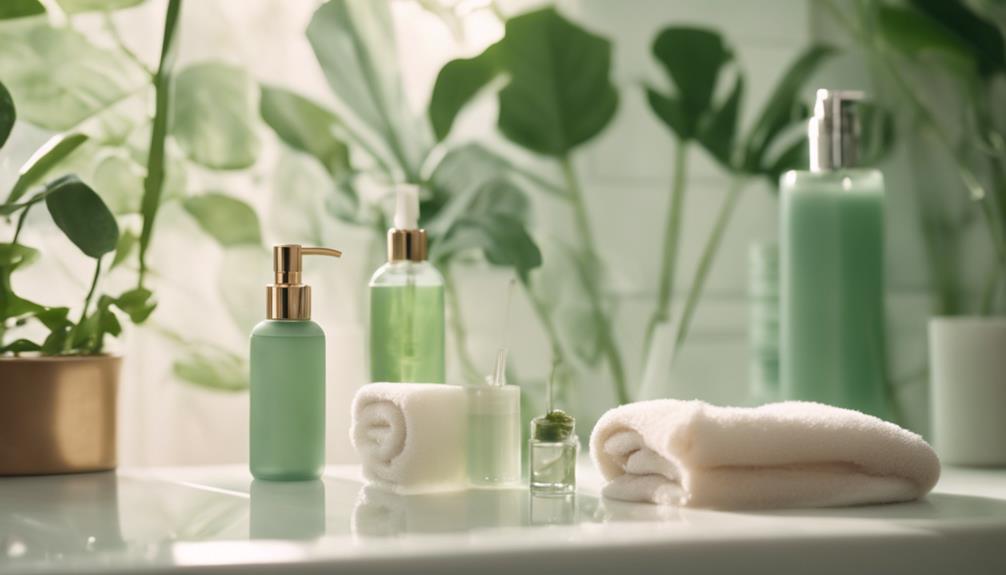To alleviate irritation in skin prone to rosacea, begin by using a mild cleanser and cleanse your face twice daily. Keeping your skin hydrated is crucial, so apply moisturizers containing ceramides and hyaluronic acid on damp skin. Shield yourself from the sun by using a broad-spectrum sunscreen with SPF 30 or higher, preferably mineral-based. Identify what triggers your skin and keep a journal to assist in managing flare-ups. Choose products that are free of fragrances and perform patch tests to confirm compatibility. Using lightweight, non-irritating makeup can also be beneficial. There is always more to learn to perfect your skincare routine and maintain comfort for your skin.
Key Takeaways
- Identify and manage personal triggers such as sun exposure, heat, and certain foods to reduce rosacea flare-ups.
- Use a mild, fragrance-free cleanser and gently cleanse your face twice daily to avoid irritation.
- Apply moisturizers with ceramides and hyaluronic acid on damp skin to enhance hydration and strengthen the skin barrier.
- Protect your skin daily with broad-spectrum sunscreen (SPF 30+) and reapply every two hours for effective sun protection.
Understanding Rosacea
Rosacea is a chronic skin condition that primarily causes persistent redness and discomfort on your face, affecting millions of people in the U.S. If you have sensitive skin, you might experience redness and inflammation, making it essential to understand what triggers your rosacea.
Common triggers for rosacea flare-ups include environmental factors like sun exposure, heat, and wind, as well as emotional stressors and certain foods, such as spicy dishes and alcohol.
Managing rosacea requires a careful approach to your skin care routine. You're not alone in dealing with this challenging condition, and while there's no known cure, proper skin care can greatly reduce flare-ups.
Start by identifying your personal triggers and adjusting your lifestyle accordingly. This might involve avoiding hot beverages or wearing sunscreen daily to protect against harmful UV rays.
Additionally, using gentle, non-irritating products formulated for sensitive skin can help soothe your complexion. By understanding rosacea and its triggers, you can take proactive steps to manage your symptoms effectively and maintain healthier skin.
Gentle Cleansing Techniques
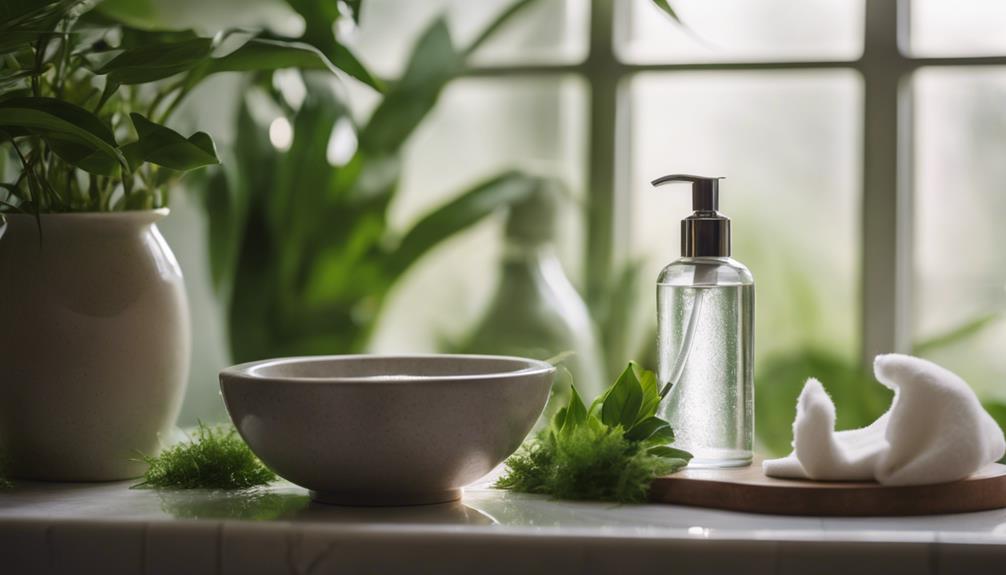
A gentle cleansing routine is vital for soothing sensitive skin prone to rosacea flare-ups. Start by choosing a mild, rosacea-friendly gentle cleanser instead of regular soap. Harsh cleansers can strip your skin of natural oils and exacerbate irritation.
To keep your skin calm, cleanse your face twice daily, using gentle circular motions with your fingertips. Avoid scrubbing, as it can lead to further irritation.
When rinsing, use lukewarm water to guarantee no cleanser residue remains on your skin. Leftover product can trigger irritation and flare-ups. After cleansing, pat your face dry with a clean, soft cotton towel. Rubbing your skin can aggravate sensitivity and worsen rosacea symptoms.
It's essential to avoid products containing alcohol, fragrance, or harsh exfoliants, as these ingredients can trigger flare-ups and increase skin sensitivity.
Importance of Hydration

Keeping your skin properly hydrated is essential to managing rosacea and reducing redness and irritation. Proper hydration helps soothe sensitive skin and enhances overall comfort. To achieve this, opt for moisturizers that contain powerful ingredients like ceramides and hyaluronic acid. These components work effectively to strengthen your skin barrier and lock in moisture, which is vital for preventing flare-ups.
To maximize hydration, apply your moisturizer on damp skin. This simple step markedly improves moisture retention, providing a calming effect that can greatly benefit your sensitive skin. Consistent use of hydrating products not only soothes your skin but also improves the effectiveness of your rosacea treatments, leading to better skin outcomes.
Be cautious with the products you choose. Avoid those with fragrances or harsh ingredients, as they can exacerbate irritation and undermine your hydration efforts. By prioritizing hydration in your skincare routine, you can create a protective layer for your skin, helping to fend off discomfort and promoting a healthier complexion.
Effective Sun Protection
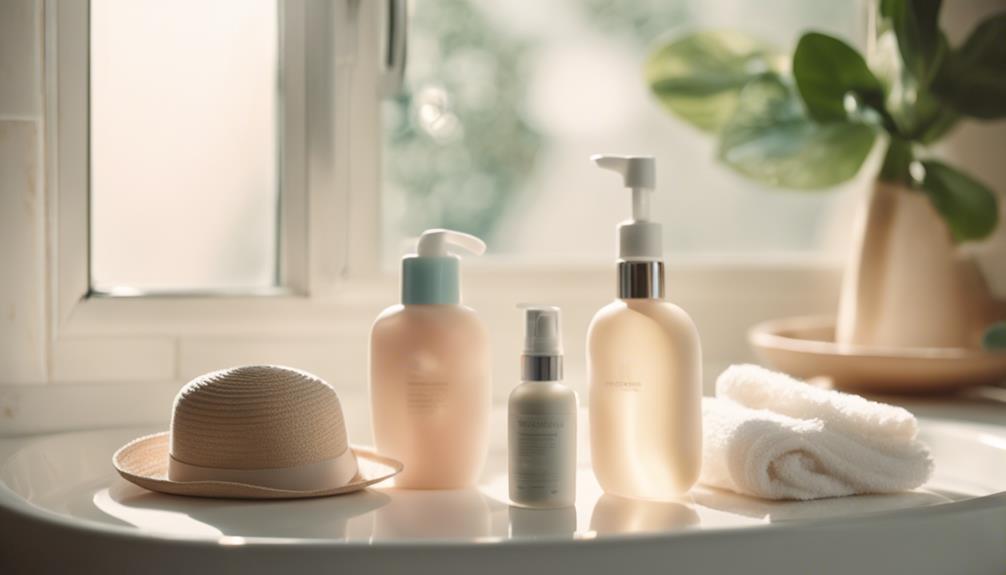
To effectively manage rosacea, daily sun protection is essential, as sun exposure often triggers flare-ups. You should use a broad-spectrum sunscreen with SPF 30 or higher to shield your skin from harmful UV rays.
Mineral sunscreens containing zinc oxide or titanium dioxide are particularly effective for sensitive skin, as they provide robust protection without irritating ingredients. Remember to reapply sunscreen every two hours, especially if you're sweating or swimming, to maintain that effective sun protection. This consistent application helps prevent those unwanted rosacea flare-ups caused by sun exposure.
In addition to sunscreen, consider wearing protective clothing, such as wide-brimmed hats and sunglasses, to further shield your skin. This added layer can greatly reduce the risk of triggering rosacea symptoms during outdoor activities.
Also, try to seek shade during peak sunlight hours, typically from 10 a.m. to 4 p.m. By taking these proactive steps, you'll not only protect your skin but also create a more comfortable environment for managing your rosacea effectively.
Prioritizing sun protection is key to maintaining healthy, calm skin.
Identifying and Managing Triggers

Identifying your rosacea triggers is vital for managing flare-ups effectively.
You might find that common culprits like sun exposure, heat, or certain foods play a role in your symptoms.
Common Rosacea Triggers
Understanding common rosacea triggers is crucial for managing flare-ups and maintaining healthier skin. Some of the most prevalent triggers include sun exposure, which can cause redness and irritation. To protect your skin, always apply sunscreen and seek shade when necessary.
Emotional factors like stress and anxiety also play a significant role, so consider incorporating stress management techniques into your routine.
Dietary choices can impact your skin too. Spicy foods and alcohol are common triggers for rosacea, so monitoring your intake might help you avoid flare-ups.
When it comes to skin care products, opt for gentle skin care that features soothing ingredients. Avoid harsh chemicals, fragrances, and alcohol, as these can increase irritation and worsen symptoms.
Don't overlook lifestyle factors either; a lack of hydration can exacerbate rosacea. Make sure you're drinking enough water daily to keep your skin well-hydrated.
Prioritizing a regular sleep schedule can also help manage symptoms effectively. By identifying and managing these common triggers for rosacea, you can take crucial steps toward calmer, healthier skin.
Personal Trigger Assessment
Keeping a detailed journal of your daily activities, food intake, and environmental factors can reveal your unique rosacea triggers. By conducting a personal trigger assessment, you'll identify what exacerbates your condition, allowing you to take proactive steps to manage it effectively.
Here are some common triggers to note in your journal:
- Sun exposure: Track time spent outdoors and any sun protection used.
- Dietary choices: Monitor your intake of spicy foods and alcohol.
Understanding these factors is essential in developing a rosacea-friendly skin care routine. Once you identify your triggers, you can adjust your lifestyle and products accordingly to reduce rosacea flare-ups.
Look for ingredients to help manage rosacea, like gentle moisturizers and soothing agents. Remember, sun protection is critical; use a broad-spectrum sunscreen daily.
Regularly review and refine your strategies based on your findings. This ongoing assessment will enhance your skin comfort and help you maintain a clear complexion.
Choosing the Right Products
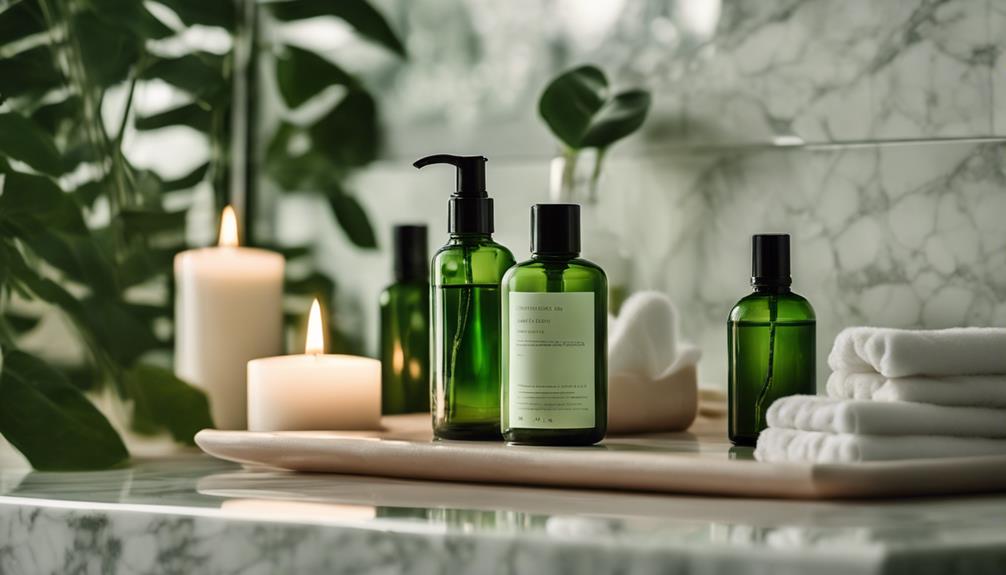
Choosing the right products for rosacea involves prioritizing fragrance-free options and avoiding irritating ingredients. When you're selecting skin care products, steer clear of those containing alcohol, menthol, and glycolic acid, as these can trigger flare-ups.
Instead, focus on non-comedogenic products specifically formulated for sensitive skin to minimize irritation and breakouts. Moisturizing creams that include ceramides can help strengthen your skin barrier, while ingredients like glycerin and hyaluronic acid effectively hydrate your skin.
Gentle cleansers infused with soothing ingredients like aloe vera and chamomile help to soothe your skin without stripping away its natural oils.
Before diving in with new products, don't forget to conduct patch tests on a small area of skin for 24 hours. This step is essential to identify any potential irritants before fully incorporating them into your routine.
Makeup Tips for Rosacea
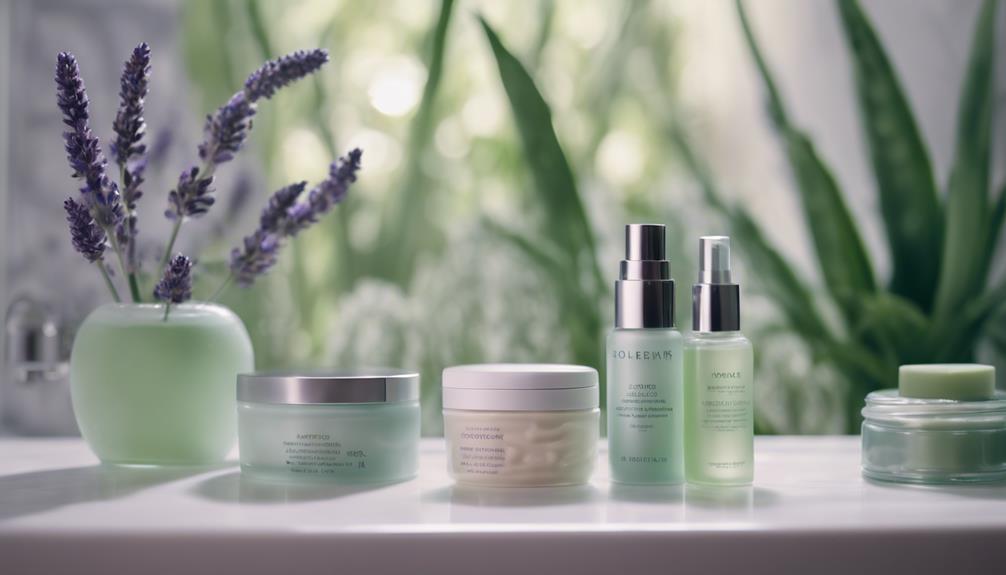
When dealing with rosacea, it's crucial to select makeup that soothes rather than irritates your skin. The right products can help manage redness and camouflage any visible blood vessels without triggering flare-ups. Here are some tips to keep in mind:
Choose Non-Irritating Formulas: Look for makeup labeled as non-irritating and suitable for sensitive skin.
Opt for Mineral-Based Foundations: These often contain soothing ingredients like aloe vera and chamomile, which help minimize skin irritation.
Test New Products: Always test new makeup on a small area of skin before applying it to your face to identify potential irritants.
For color correction, yellow-tinted concealers can effectively neutralize redness, while green-tinted concealers help camouflage visible irritation.
Additionally, opting for powder formulations over liquids or creams can reduce the risk of irritation, giving you a lightweight feel.
Can I Use a Detailed Skincare Routine to Calm and Soothe My Rosacea?
If you have rosacea, a detailed skincare routine steps can help to calm and soothe your skin. Incorporating gentle and non-irritating products, such as a gentle cleanser, hydrating moisturizer, and targeted treatments can help manage symptoms and improve skin texture. Always consult with a dermatologist for personalized advice.
Conclusion
In your journey with rosacea, think of your skincare routine as a gentle breeze, soothing the storm.
By embracing gentle cleansing, hydration, and sun protection, you're nurturing your skin like a tender gardener tending to delicate blooms.
Recognizing triggers and choosing the right products empowers you to take control, while thoughtful makeup can enhance your natural beauty.
With patience and care, you'll cultivate a calm, radiant complexion that reflects the strength within you.




